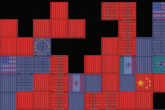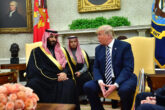August 13, 2020
On Export Controls, the United States Must Focus on Effectiveness
Export controls are able to achieve some policy goals largely on their own, such as slowing target countries’ access to key technologies and limiting diversion of technology to sanctioned countries. However, there are other goals, like promoting human rights, or strengthening the defense industrial base, where export controls are only effective when combined with other policy tools, such as public statements, international negotiations, domestic investments, and procurement policy.
For almost any policy goal, export controls will be much more effective if they have broad international support among the countries that have relevant technology capability. There are very few technologies outside the defense sector where U.S. industry has a unique capability. In the absence of international support, U.S. export controls are likely to be ineffective in achieving their objective, and instead will damage the U.S. industry and promote the development of non-U.S. industry. This previously has occurred in both commercial communications satellites and night vision equipment. International support requires not just including items on multilateral control lists such as the Wassenaar Arrangement (which is the current approach), but also multilateral agreement on licensing policies and end-use or end-user controls. In many cases, this will require U.S. allies to change their domestic laws.
Relatedly, export controls will be more effective if they are narrowly tailored to specific national security objectives. Other countries are more likely to join the United States in controlling a specific technology for specific reasons. It will be more difficult to win support for broad controls that seek to damage the target country’s industry generally, given that other countries will have concerns about the impact of broad controls on their own exports and commerce.
Export controls will be more effective if they are narrowly tailored to specific national security objectives.
Finally, export controls depend on industry for their effectiveness. Industry must be aware of the controls, and dedicate significant, ongoing resources to developing and updating compliance programs, training, and auditing. Effective export controls depend on government-industry partnership. Government can contribute by involving industry in the development of new rules by letting industry explain the competitive landscape in terms of technical capabilities and market trajectory, doing outreach once a rule is developed, and clarifying rules where needed. Outreach is particularly important for smaller enterprises with fewer compliance resources.
About the Author
Peter Lichtenbaum is a Partner at Covington & Burling LLP.
Learn More
CNAS has asked a group of experts and policymakers to offer their perspectives on the policy goals that U.S. export controls should serve, and how and under what circumstances U.S. export controls can effectively achieve those policy goals.

Export Controls Are a Defining Instrument of U.S. National Security
A group of experts and policymakers offers their perspectives on the policy goals that U.S. export controls should serve....
Read MoreMore from CNAS
-
Game Over?
The trade wargame suggests that sustained high tariffs could create leverage and urgency to spur action toward a productive restructuring of the international trade system....
By Emily Kilcrease & Geoffrey Gertz
-
Middle East Security / Energy, Economics & Security
Trump Inks $600 Bn Deal In Saudi Arabia | Musk, Blackrock CEO Flank Trump In Gulf VisitIn today's episode of India Global, U.S. President Donald Trump secured a $600 billion commitment from Saudi Arabia on Tuesday to invest in the United States. NDTV's Gaurie Dw...
By Daniel Silverberg
-
Energy, Economics & Security / Technology & National Security
Tariffs and Tech: An Uncertain RecipeHigher tariffs could prompt American cloud companies to shift more of their capital investments abroad....
By Pablo Chavez
-
Trump Tariffs: How Will U.S. Plans Reshape the Global Economy?
Donald Trump says he's already decided the tariffs he will impose on countries that export goods to America, including the United Kingdom. Channel 4 hears from Emily Kilcrease...
By Emily Kilcrease




